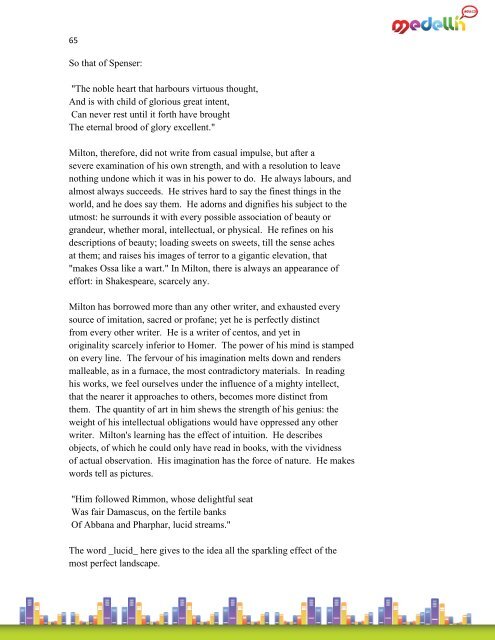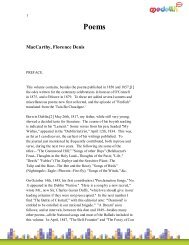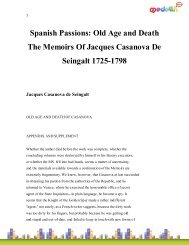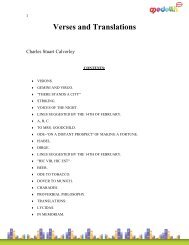Lectures On The English Poets William Hazlitt
Lectures On The English Poets William Hazlitt
Lectures On The English Poets William Hazlitt
You also want an ePaper? Increase the reach of your titles
YUMPU automatically turns print PDFs into web optimized ePapers that Google loves.
65<br />
So that of Spenser:<br />
"<strong>The</strong> noble heart that harbours virtuous thought,<br />
And is with child of glorious great intent,<br />
Can never rest until it forth have brought<br />
<strong>The</strong> eternal brood of glory excellent."<br />
Milton, therefore, did not write from casual impulse, but after a<br />
severe examination of his own strength, and with a resolution to leave<br />
nothing undone which it was in his power to do. He always labours, and<br />
almost always succeeds. He strives hard to say the finest things in the<br />
world, and he does say them. He adorns and dignifies his subject to the<br />
utmost: he surrounds it with every possible association of beauty or<br />
grandeur, whether moral, intellectual, or physical. He refines on his<br />
descriptions of beauty; loading sweets on sweets, till the sense aches<br />
at them; and raises his images of terror to a gigantic elevation, that<br />
"makes Ossa like a wart." In Milton, there is always an appearance of<br />
effort: in Shakespeare, scarcely any.<br />
Milton has borrowed more than any other writer, and exhausted every<br />
source of imitation, sacred or profane; yet he is perfectly distinct<br />
from every other writer. He is a writer of centos, and yet in<br />
originality scarcely inferior to Homer. <strong>The</strong> power of his mind is stamped<br />
on every line. <strong>The</strong> fervour of his imagination melts down and renders<br />
malleable, as in a furnace, the most contradictory materials. In reading<br />
his works, we feel ourselves under the influence of a mighty intellect,<br />
that the nearer it approaches to others, becomes more distinct from<br />
them. <strong>The</strong> quantity of art in him shews the strength of his genius: the<br />
weight of his intellectual obligations would have oppressed any other<br />
writer. Milton's learning has the effect of intuition. He describes<br />
objects, of which he could only have read in books, with the vividness<br />
of actual observation. His imagination has the force of nature. He makes<br />
words tell as pictures.<br />
"Him followed Rimmon, whose delightful seat<br />
Was fair Damascus, on the fertile banks<br />
Of Abbana and Pharphar, lucid streams."<br />
<strong>The</strong> word _lucid_ here gives to the idea all the sparkling effect of the<br />
most perfect landscape.

















